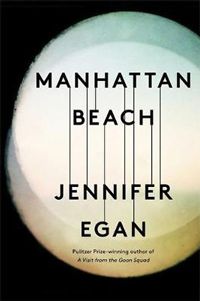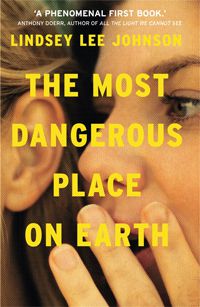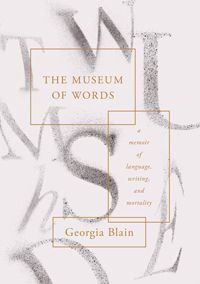Each week we bring you a sample of the books we’re reading, the films and TV shows we’re watching, and the music we’re listening to.
Bronte Coates is reading Manhattan Beach by Jennifer Egan
I’ve always felt slightly guilty for my indifference towards Jennifer Egan’s Pulitzer Prize winning novel A Visit from the Good Squad, and especially at Readings where it is such a favourite with my colleagues. It’s not that I thought the novel was badly written but I just wasn’t engaged in the story as much as I’d like to be. So when one Egan devotee recommended I give her new novel a try, saying that it was an entirely different work from Goon Squad but equally impressive, I took their advice and snagged an early review copy.
Opening in Brooklyn during the Great Depression and then flashing forward to the midst of World War II, Manhattan Beach follows three characters and the ways their lives intersect. The world of his book is wonderfully, wholly realised, rich in details that never feel laboured, and the prose is confident and assured, ensuring you immediately feel in safe hands. Egan pulls of that neat trick of historical fiction where the story somehow feels modern without ever straying from the restraints of its time period. I especially loved seeing Anna’s story unfold as she determines to become a diver, despite the odds. In short, Manhattan Beach is exactly the kind of immersive, gripping historical novel that I like best.
On a completely different note, I also recently read Tamara Moss’s children’s novel, Lintang and the Pirate Queen. This is a high-stakes adventure that invites readers into a land of magical (sometimes dangerous) creatures and pirates with hearts of gold. As the brave and passionate Lintang begins to discover the wider world beyond her sheltered home, she finds her beliefs challenged by the injustice she encounters. Moss gently draws parallels with political issues in our society in a way that makes them digestible for children of ages 9 and up. Lintang was recently featured on our list of recommended children’s fiction from emerging Australian writers – find them all here.
Annie Condon is reading The Most Dangerous Place on Earth by Lindsey Lee Johnson
The Most Dangerous Place on Earth is a wonderful debut novel from a young American writer. Set over four years, it follows a grade of high school students in a privileged enclave, and examines issues of trust, responsibility, guilt and connection. The novel received some negative reviews in mainstream US press, but I was riveted – the story is told from the perspective of multiple teenagers but never loses its intimacy or focus. The central tragedy in the novel is always present. I particularly enjoyed the perspective of the naive first-year teacher who is desperate to ‘fit in’ and at risk of overstepping boundaries with students and other teachers.
Chris Gordon is reading about grief
I don’t often write about the amazing events that happen at Readings, but today I do feel compelled to share some stories from one particular event. Earlier this week, our Carlton shop hosted a panel with three local authors, all of which tackle the reality of grief in their work. Mark Baker is the author of Thirty Days, a compelling memoir about the recent death of his wife. Hannah Robert’s memoir, Baby Lost, tells the story of her baby dying when she was 8 months pregnant. And Melanie Joosten’s novel Gravity Well poses questions about how we deal with grief.
At this panel, the authors discussed whether writing these kinds of books allows them freedom from the relentless nature of grief, and concluded that it did not. They also reasoned that is was human’s common fear of the unknown that impels people to share these kind of stories, in the hope of understating what death actually means. The importance of finding the means to both connect and disconnect to a painful situation was explored. Ultimately, the panel decided that it was grief that was propelling the story – as well as a desire to expose pain.
Throughout the discussion, the panel named several other authors who write movingly about grief. These included Imre Kertész, Georgia Blain, Joan Didion, and of course, Julian Barnes. My father-in-law died recently, following a long battle with poor health. As I was listening to the wonderful panel, I suddenly realised that I had been reading stories of grief for the past months, without conscious thought as to why. Clearly, I had been looking for ways to make sense of the sadness that had fallen over my family. Did reading books of this nature help me? It did, and it will continue to do so.





